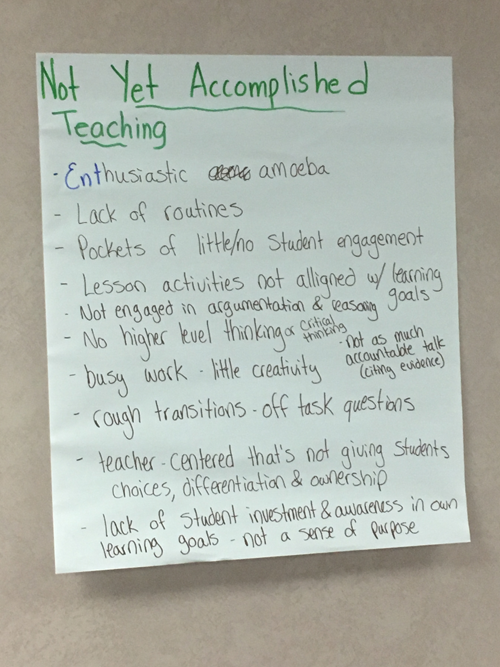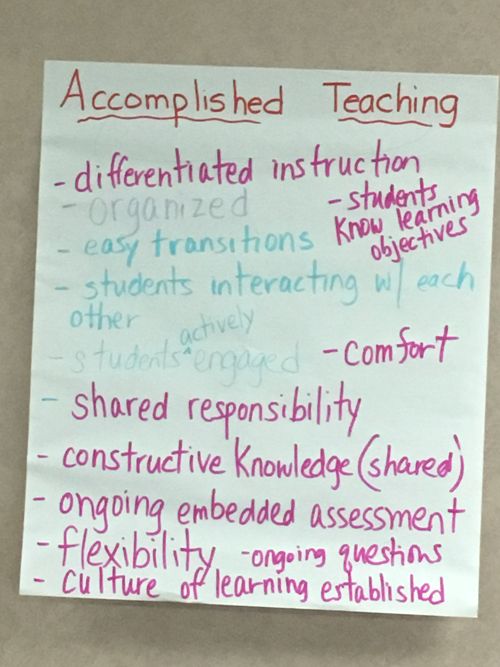Do you ever have an “Ah Ha” moment, only to wonder what was possibly wrong with you that you didn’t make the connection before? For example, the first time I discovered that cream cheese and jelly are a fabulous combination on crackers. It was perfectly obvious that this would be a delectable duo, but yet I had never put the two together! Well, an “ah ha” moment of this variety happened to me at a candidate support training. I’ve been thinking about connecting my experiences as an NBCT with Carol Dweck’s “Growth Mindset,” but it took a whole room of NBCTs to help me understand exactly how synergistic the relationship between accomplished teaching and Growth Mindset actually is.
We were doing some preliminary thinking about the polarities–what does Accomplished Teaching look like? What does novice (not yet accomplished) teaching look like? We broke into our groups, and as I watched our “recorder” write down our ideas, the proverbial lightbulb went off. The attributes of accomplished teaching we brainstormed were perfect examples of the Growth Mindset in action, while the attributes of not yet accomplished teachers were almost entirely examples of the Fixed Mindset. This shouldn’t be shocking, but I felt so validated by this visual representation of the connections. Sometimes, I think that as the “next thing” comes along, we forget that professional development is a layering in of new ideas, not necessarily replacing our previous assumptions. Here are some of the key takeaways about accomplished teaching and the Growth Mindset:

1) Accomplished Teaching is differentiated, which means that there is not a singular approach, a correct methodology for everyone. Teachers must demonstrate the willingness to explore and learn new strategies and set aside “fixed” plans. Accomplished teaching challenges notions that certain teachers are “creative” and others “analytical,” instead recognizing that these are not set in stone and the needs of students are the first concern of teaching. We can learn that if a given group of students needs something from us that we aren’t equipped to handle, we can learn what we need to know, not give up on any group as a “difficult group.”
2) Accomplished Teaching shares responsibility and employs a constructive approach to the learning. Teachers are not the sole proprietors of knowledge and must teach students that the pursuit of understanding is fluid–sometimes we will be the person in the room who knows the most, but many times we will need to be open to new learnings. The more we all learn, the more we realize there is so much more we need to know. Importantly, this can mean a shifting understanding of expertise, one in which the student is more knowledgeable than the teacher. Shoulder to shoulder learning is a sign of an accomplished teacher when we are engaging students in authentic tasks and seeking deeper understanding than what we’d find in a textbook.

3) Accomplished teaching uses ongoing embedded assessments that are seamless. Life (and learning) is not usually about a defining moment of growth, but rather about an approach to experiences. Accomplished teaching is not about “covering material,” but instead about elevating individual knowledge and encouraging constant growth and reflection. As Accomplished teachers, we will need to model our ability to handle mistakes, correct misinformation, and reflect on our errors and learn from them. Students should hear us accept responsibility and reflect on what to change for next time, “Well, that didn’t go as planned. I wonder what I could do differently next time?” In a sense, we are always “Not yet” in our teaching.
If you choose to become a Candidate Support Provider, or in your role as a teacher leader, it is important that we recognize how the goals of the National Board process align with current ideology around teaching, and capitalize on it. National Board Certification is rigorous, reflective, and relevant, easily synergistic with Growth Mindset if we are just able to see that the two are good together, the jelly to my cream cheese crackers–a great combination that you just might not have thought of yet!
